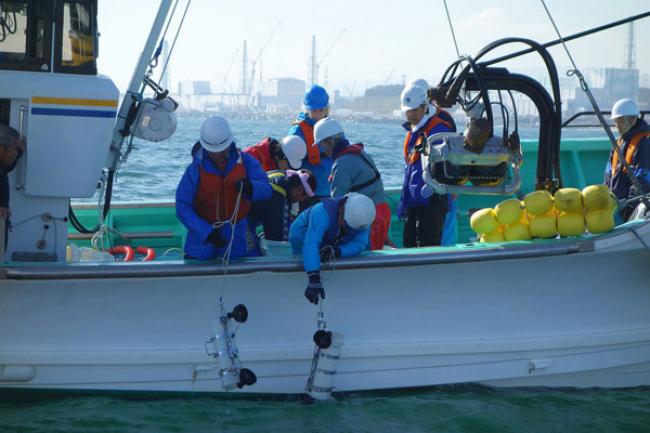21 Nov 2014

Speaking at the International Atomic Energy Agency’s (IAEA) Board of Governors meeting this morning in Vienna during which he presented the body’s latest Climate Change and Nuclear Power report, Director General Yukiya Amano explained that nuclear energy was bound to play a larger role in national energy programmes worldwide as global energy demand was “likely to grow dramatically in the coming decades.”
“Along with hydropower and wind, nuclear energy has the lowest life-cycle CO2 emissions,” Amano said. “As part of a low-carbon national energy portfolio, it contributes to the mitigation of climate change and can help to reduce concerns over volatile fuel prices and security of energy supply.”
The launch of Climate Change and Nuclear Power 2014 comes just ahead of the next round of UN climate talks to be held from 1 to12 December 2014 in Lima, Peru, where countries are expected to negotiate and shape their contribution to reducing carbon emissions before next year’s flagship meeting in Paris.
In the Peruvian capital, the IAEA will be showcasing its report in an effort to highlight nuclear power’s “contribution to the global climate change agenda,” the agency noted in a press release, adding that the report discusses nuclear power’s “non-climatic environmental benefits, such as helping reduce local and regional air pollution” while also being considered in climate change adaptation measures, such as seawater desalination or hedging against hydropower fluctuations.
In his remarks, Amano reassured delegates that the report also focussed on the importance of safety and security measures when utilizing nuclear energy, pointing to his agency’s upcoming project devoted to the decommissioning of damaged nuclear facilities.
“The aim is to enhance measures to ensure the safe long-term management of spent fuel and nuclear waste from disused facilities,” he continued, noting that the IAEA was still in the process of compiling its “extensive report” on the Fukushima Daiichi accident.
He added that the agency continued to assist the Japanese Government in sharing information internationally and that a recent comparison of results of sea water analysis off Japan’s east coast, carried out by IAEA and Japanese laboratories, confirmed that data regularly reported by Japan give an accurate picture of the levels of radioactivity in near-shore coastal waters.
As for the DPRK, Amano said he remains “seriously concerned” about the country’s nuclear programme. “I call upon the DPRK to comply fully with its obligations, to cooperate promptly with the Agency, and to resolve all outstanding issues, including those that have arisen during the absence of Agency inspectors from the country.”
Turning to Iran, Amano said that while the IAEA continued to verify the non-diversion of nuclear material declared by Iran under its Safeguards Agreement, the agency was “not in a position to provide credible assurance about the absence of undeclared nuclear material and activities” in the country. As a result, he said, the IAEA remained unable to conclude that “all nuclear material in Iran is in peaceful activities.”
In addition, Amano told the Board that the agency remained ready to “accelerate the resolution of all outstanding issues” under the Framework for Cooperation but still awaited certain clarifications from the Gulf country.
“Iran has not provided any explanations that enable the agency to clarify the outstanding practical measures, nor has it proposed any new practical measures in the next step of the Framework for Cooperation, despite several requests from the agency,” he stated.
“I call upon Iran to increase its cooperation with the Agency and to provide timely access to all relevant information, documentation, sites, material and personnel.”
Iran’s nuclear programme – which its officials have stated is for peaceful purposes, but some other countries contend is driven by military ambitions – has been a matter of international concern since the discovery in 2003 that the country had concealed its nuclear activities for 18 years in breach of its obligations under the Nuclear Non-Proliferation Treaty (NPT).
Addressing this issue in a statement attributable to his spokesperson, Secretary-General Ban Ki-moon highlighted the importance of the resumption of talks between the so-called P5+1 – composed of the United States, Russia, China, United Kingdom, and France, plus Germany – and the Iranian Government and called on all participants “to demonstrate the necessary flexibility, wisdom and determination to bring the negotiations to a successful conclusion.”
“The Secretary-General hopes that reaching a mutually-acceptable and comprehensive agreement will restore confidence in the peaceful nature of Iran’s nuclear programme,” declared the statement.
“He is convinced that such an accord can contribute to the strengthening of regional and international peace and security at a time when global cooperation is needed perhaps more than ever.”
IAEA marine experts and Japanese scientists collect water samples in coastal waters near the Fukushima Daiichi Nuclear Power Station. Photo: IAEA/Petr Pavlicek